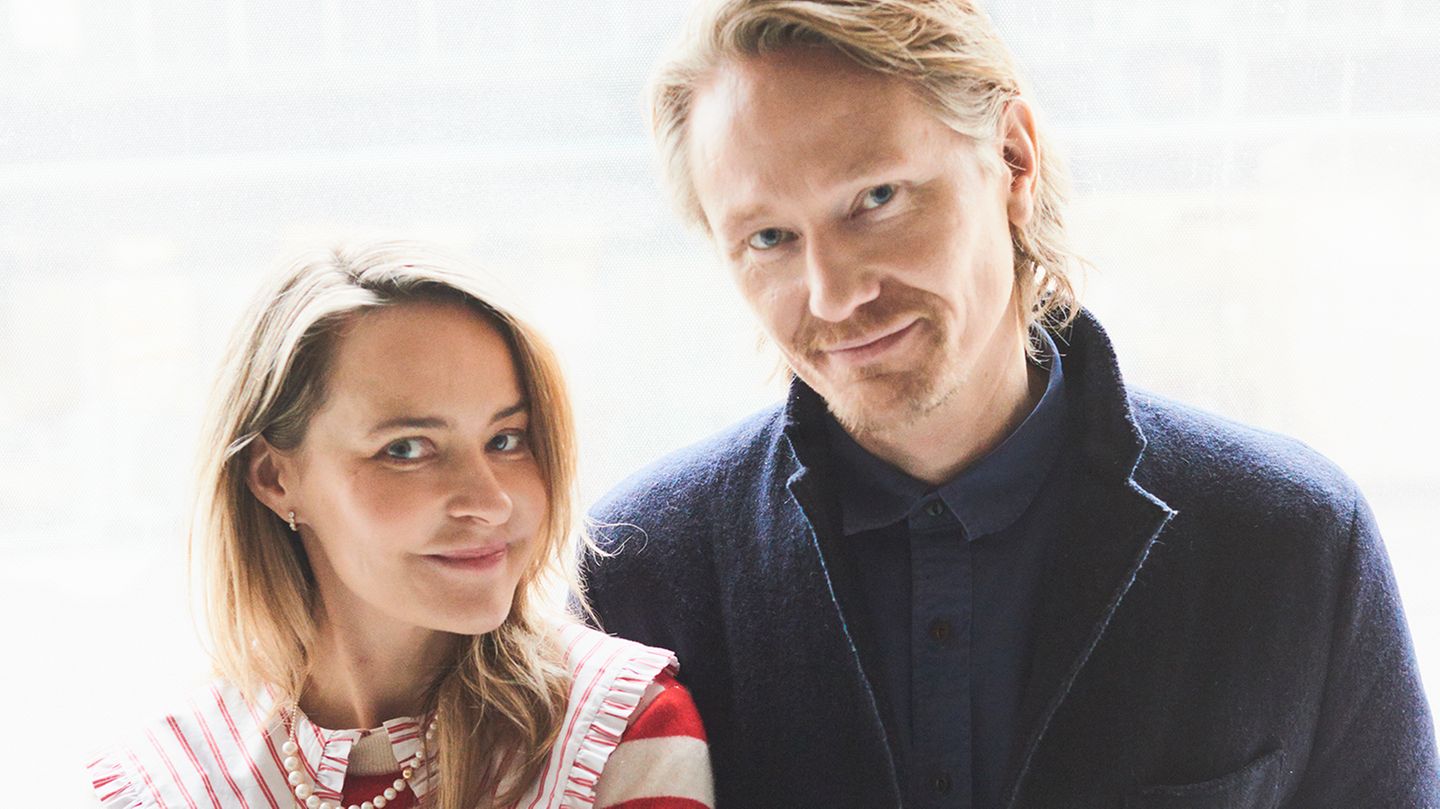The Danish brand Ganni focuses on fair fashion. The founding couple Ditte and Nicolaj Reffstrup talk about dresses made from mushrooms, the sense of style in Germany and why women love leo patterns
Last year, Michelle Obama caused a stir during her book tour when she appeared in a denim suit. It was custom made by Ganni. What was it like when the former US first lady called and ordered a suit?
Ditte Reffstrup: Of course she didn’t call personally, but her stylist Meredith Koop. Both have been working together for many years. She contacted us and commissioned the heavy denim suit for the former US First Lady. In fact, Michelle Obama is very tall and has long legs. We therefore made a suit according to her measurements.
Did you know that Michelle Obama would wear it?
Ditte Reffstrup: No, but we hoped so. The surprise was all the greater when she wore it to a performance in Washington in mid-November. We were incredibly proud! Such an appearance is not everyday for us.
How was the response?
Ditte Reffstrup: The demand was enormous, the suit was sold out within the first few weeks. We had him re-produced three times. Michelle Obama’s appearance turned out to be a great success, both in terms of sales and media presence.
Michelle Obama isn’t the only one wearing Ganni. You are successful worldwide with your fashion. What makes you special?
Ditte Reffstrup: We don’t follow megatrends, we design fashion that we want to wear ourselves. I believe that is the secret of our success. Women with different body shapes work in our studio. Whether big, small, slim or curvy – everyone should feel comfortable in our fashion. She doesn’t exclude anyone. We also pay attention to sustainable fashion and fair prices. Ganni is a democratic brand. That goes down well.
Her fashion is not cheap, but affordable. Nevertheless, in stores it often hangs between brands such as Bottega Veneta or Celine. How did you make the leap into the luxury league?
Nicolaj Reffstrup: We wanted to be an international brand from the start and not rest on our laurels in Scandinavia. Even if we are not a luxury label, we often behave like this. We put on a show twice a year, we run big campaigns, we work with influencers. This is how the online giant Mytheresa.com took notice of us, and later retailers from all over the world.
A few years ago there was a Ganni blazer called “The Merkel”. It came in many colors. A nod to Angela Merkel’s colorful blazers?
Ditte Reffstrup: Oh, that must have been a long time ago, probably in 2016. Back then, our collection pieces still had names. I don’t consciously remember that we named this blazer after Angela Merkel. But back then we had a lot of fun giving our parts special names. Some were made in the middle of the night.
Let’s stay with the Germans. They are not necessarily considered to be stylish – and above all not as fashionable. How do you still manage to convince German women of brightly colored fashion?
Ditte Reffstrup: I think you are a bit too strict with your compatriots. Ganni has been in Germany for many years, our fashion is humorous, puts you in a good mood and makes the wearer feel good. A concept that German women also like. If you convince them of a product or a brand, they remain loyal customers.
Apart from the bright colors, there is a pattern that runs like a red thread through your collections: Leo. Why are women of all ages crazy about it?
Ditte Reffstrup: It may sound unusual, but for me Leo is like a non-pattern. I don’t see it, it’s like black to me.
What do you mean?
Ditte Reffstrup: I probably used to watch too much “Dallas” and “Denver”! I think you can wear Leo anytime, anywhere, it adapts. Just like black. Only it is not symbolic of seriousness, but of humor. Of course there are women who stage themselves as hot kittens in Leo. But there’s also something humorous about the smudge print. Especially if you mix it with other patterns or with rough fabrics. The contrast creates excitement and removes the cliche from the leopard print. I like that.
“Ganni is sexy – but more from a female point of view”
Let’s move on to another trend: beige. Why is this color all the rage right now?
Ditte Reffstrup: Who would have thought that beige would one day experience hype?! But the pandemic and the war in Ukraine are having a strong impact on fashion, including fashion. On Instagram, women and young girls stage themselves as vanilla girls and show themselves in neutral clothes. Beige is like the mirror of our time: some prefer to keep themselves and their clothes understated, others want to let off steam with fashion and bright colors.
Ganni is loud – but also sexy?
Ditte Reffstrup: Men used to define what is sexy. That’s different today. To me, a woman is attractive when she is comfortable in her body and with fashion. You don’t need a super short skirt or high heels for this. Ganni is sexy – but more from a female point of view.
Mr Reffstrup, how do you see it?
Nicolaj Reffstrup: I agree with Ditte. A supposedly sexy-looking look can also be repulsive instead of attractive. Sexyness is not defined by hem length, but by self-confidence.
You have just opened a new store in Hamburg, it is the second in this country. How important is the German market?
Nicolaj Reffstrup: We were represented in Germany from the start, it is an important market for us. When it comes to quality and sustainability, the Danes and Germans are no different. In both countries there is a great demand for conscious consumption.
You hired a manager for sustainability issues back in 2013. How did that happen?
Ditte Reffstrup: Nicolaj has always been far ahead when it comes to sustainability. When we hired a sustainability manager in 2013, he was convinced that we were way too late. Even then, he was keenly interested in the effects of global warming and the climate. Today we talk about it as a matter of course over supper, but back then the topic of sustainability was still very abstract. It is all the more curious that we are considered pioneers today.
Millions of tons of new clothes are produced every year. The textile industry is considered one of the biggest climate sinners. Why did you start a fashion label in the first place?
Ditte Reffstrup: A legitimate question that we also asked ourselves. Nevertheless, our approach is: We want to show that it can be done better. Our clothing is certified, we use recyclable materials, use leftover fabrics for new things, experiment with renewable resources such as mushrooms, and have devised rental and second-hand programs. There have long been enough sustainable concepts, but you have to have the will to implement them. There is no longer an excuse to ignore sustainability.
Nevertheless, the majority of Ganni belongs to the investment company L. Catterton, which belongs to the luxury group LVMH and focuses on one thing above all: profit and strong growth. How does that fit with the concept of Ganni?
Nicolaj Reffstrup: The L. Catterton company belongs to LVMH, but there is no direct exchange with the brands or the Arnault family, which controls the group. We are not experiencing any pressure from L. Catterton and hope it stays that way. We are undeterred in pursuing our concept of responsible fashion. Even if it would be far cheaper to produce a garment the traditional way, we still manufacture as sustainably as possible.
So you don’t feel any pressure to succeed?
Nicolaj Reffstrup: Above all, we set it ourselves. A few years ago, we disclosed our plan with 44 goals, which encompasses the areas of people, planet, product and prosperity and shows all our targets. For example, we want to reduce our CO2 emissions by 50 percent by 2027 by using innovative materials and renewable energies. We also try to achieve around 10 percent of our sales through rental and second-hand concepts. We will not achieve all goals, but we will try to implement as many as possible.
Is sustainability a question of money?
Nicolaj Reffstrup: First and foremost you need the right mindset. Especially if you want to do it right. But pioneering work rarely succeeds without investment. I believe that 95 percent of all brands would like to produce more sustainably, but they don’t have the means to do so.
What drives you not to give up?
Ditte Reffstrup: When I look back today, I am proud of what we have achieved. My team drives me to keep going, as do my kids.
What influence do they have on your work?
Ditte Reffstrup: Our children are very committed, we often talk about sustainability issues at home. Not with a wagging finger, but we try to teach them things like that strawberries aren’t available during the Danish winter. We noticed that we are a bit more committed than other parents in this regard when our daughter recently had to give a presentation at school.
“I haven’t gone shopping in six or seven years”
What happened?
Ditte Reffstrup: Instead of reporting on the pet like most of the class, she spoke about the consequences of global warming. That scared us as parents – but also made us proud!
They have three children. What do you say to them when, like many teenagers, they just want to go shopping?
Nicolaj Reffstrup: They do that, but they buy second-hand fashion.
How about you?
Nicolaj Reffstrup: I haven’t gone shopping for six or seven years.
Ditte Reffstrup: It’s similar for me. Either I wear second hand or Ganni. I’m my best customer – but also my most critical.
Source: Stern
I am an author and journalist who has worked in the entertainment industry for over a decade. I currently work as a news editor at a major news website, and my focus is on covering the latest trends in entertainment. I also write occasional pieces for other outlets, and have authored two books about the entertainment industry.




